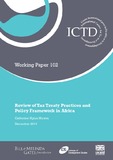| dc.contributor.author | Mutava, Catherine Ngina | |
| dc.coverage.spatial | Africa | en |
| dc.date.accessioned | 2019-12-17T12:58:29Z | |
| dc.date.available | 2019-12-17T12:58:29Z | |
| dc.date.issued | 2019-12-16 | |
| dc.identifier.citation | Mutava, C. N. (2019) Review of Tax Treaty Practices and Policy Framework in Africa, ICTD Working Paper 102, Brighton, IDS | en |
| dc.identifier.isbn | 978-1-78118-603-9 | |
| dc.identifier.uri | https://opendocs.ids.ac.uk/opendocs/handle/20.500.12413/14900 | |
| dc.description.abstract | In recent years, tax treaties concluded by sub-Saharan African countries have become more residence-based with fewer provisions allocating taxing rights to the source countries. This trend is observed in treaties signed with OECD countries in particular. For countries which are capital importers, as is the case with most African countries, this means that these countries have been slowly ceding their taxing rights over income earned within their jurisdiction. This could be deliberate as the countries try to attract foreign direct investment, or it could be the result of a lack of policy to guide treaty negotiations. In the countries we reviewed, the latter reason seemed to prevail.
From this study, it is apparent that many sub-Saharan African countries do not have a treaty policy in place. The lack of a policy creates ambiguity on matters such as who should be involved in negotiating and concluding tax treaties, which countries are viable treaty partners, and the minimum tax treaty terms that a country should contend for. This provides room for political and elite capture of the negotiation process and leads to the conclusion of treaties without adequate consideration of their technical implications, which could therefore be detrimental to the country.
A well-crafted and properly implemented treaty policy could go a long way in resolving most of the issues faced by sub-Saharan African countries in concluding tax treaties. The lack of capacity and technical understanding of tax treaties makes development of such treaty policy and model treaties an uphill task for most sub-Saharan African countries. Thus, there is need for training and capacity building in the area of tax treaties, and help in the formulation of a tax treaty policy and model. This training and help can come both from experts within the countries themselves and through external support from other countries. | en |
| dc.language.iso | en | en |
| dc.publisher | IDS | en |
| dc.relation.ispartofseries | ICTD Working Paper;102 | |
| dc.rights.uri | http://creativecommons.org/licenses/by-nc/4.0/ | en |
| dc.subject | Economic Development | en |
| dc.subject | Finance | en |
| dc.title | Review of Tax Treaty Practices and Policy Framework in Africa | en |
| dc.type | Series paper (non-IDS) | en |
| dc.rights.holder | Institute of Development Studies 2019 | en |
| dc.identifier.team | Governance | en |
| rioxxterms.version | VoR | en |


